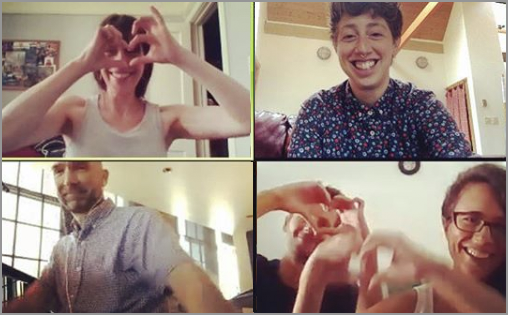You probably know the feeling:
You have a variety of different projects to get done. Several approaching deadlines loom over your head. Your growing to-do list might make you question whether you’ve ever gotten anything done at all. Plus, you feel like you’re probably forgetting something.
While these thoughts may be a common side effect of a busy schedule, multipotentialites seem to be uniquely prone to experiencing them on a regular basis. I recently realized that, even though I have been less busy than usual for a couple of months, my mind and body still tend to be operating like I have tons to get done and not enough time to do it all. I became so accustomed to juggling multiple (read: way too many) tasks and responsibilities simultaneously that my mind and body began to take it for granted.
I can easily trace this underlying sense of overwhelm and the scarcity of time back to my experiences in college, balancing my time (often precariously) between classes, part-time work and internships, research, clubs and organizations, and ensemble rehearsals and performances. Hindsight really can be 20/20—I didn’t fully grasp the potential for this type of schedule to become toxic until I had a few months of separation from my college lifestyle.
Learning from the let-down effect
I recently came across a phenomenon called the let-down effect, which describes how our body can respond to a time of stress after it’s over. During periods of heightened stress, our limbic system coordinates the release of hormones that aid us in meeting the challenges at hand. But as these hormones dissipate, their aftermath can leave the body more vulnerable to physical illness and mental health ramifications.
While the best remedy for the let-down effect is to avoid its triggers in the first place, the next best option involves decompressing following a stressful period. Notably, this process can include staying relatively busy while gradually decreasing your stressors to allow your body time to adjust without dropping hormone levels too abruptly. I personally learned about this process a bit too late to avoid experiencing some symptoms of the let-down effect myself, but it made me realize the importance of preventing myself from falling into similar situations in the future.
Like many multipotentialites, I actually enjoy balancing several different types of work and activities simultaneously. But the key is just that: balance. And achieving balance inherently depends on our relationships with time in our daily lives.
What’s your relationship with time?
Do you think of time as the enemy, passing rapidly while you struggle to keep up with all of your responsibilities and pursuits? Or do you think of time as a precious gift to be cherished and filled with living your life to the fullest?
If you’re like me, you might do your best to balance mindfulness of the present moment with planning for the future, but often fall back into thinking of time as scarce and fleeting. The way we think about time directly guides how we make decisions related to time management and impacts our emotional relationships with time in both short-term and long-term contexts.
Now that 2023 is here, I have also been thinking about the momentous role of time in our new years’ resolutions. Not only does our relationship with time guide what types of resolutions we make (or decide not to make) and whether we stick with them, but it also affects our emotional connections with our resolutions and the motivation behind them. From a more existential standpoint, new years’ resolutions may be guided by our long-term relationships with time within the context of our lives and how we envision our life trajectories unfolding.
Reflecting back on some of my past new years’ resolutions, I realized that most—if not all—resolutions involve a time element. If you want to start doing yoga regularly, you need to set aside time to go to classes or dedicate time to practicing on your own. If your resolution involves going back to school part-time, you need to balance your class and homework time with your work schedule. If you want to travel more, you need to plan your trips around your other work, school, or family commitments. Actively dedicating time to a particular activity makes it much easier for you to do it, both short-term and long-term.
Do you think of time as the enemy, passing rapidly while you struggle to keep up with all of your responsibilities and pursuits? Or do you think of time as a precious gift to be cherished and filled with living your life to the fullest?
Befriending time through new years’ resolutions (or lack thereof)
Of course, our relationship with time impacts how well we stick to new years’ resolutions. But our resolutions (or lack thereof) can also serve as tools to help us relate to time in a more healthy and positive way. Here are three pairs of questions that helped me to establish a foundation to develop a more positive relationship with time. I hope they will help you, too—whether you decide to set new years’ resolutions or not!
1. Are you happy with how you’ve been spending your time on a day-to-day basis? Is there anything notably missing from your schedule?
Assessing what you dedicate your time to each day and considering whether you are happy with how you’ve been spending your time is one of the first steps to developing stronger time management skills. Thinking critically about how you have been spending your time can enable you to identify areas you want to dedicate more time to, as well as activities you may want to cut back on.
Importantly, the goal of this exercise is NOT to make you feel bad about what you have used your time to do! Also, do your best not to think of time spent resting or recharging between tasks as “wasted” because relaxation can be a major factor supporting mental health, allowing you to bring your best self to your work and hobbies.
2. What would a healthier relationship with time look and feel like for you? What steps can you take to cultivate the relationship with time that you envision for yourself?
Based on what you learned from the first question, you might already have some ideas about how you could improve your relationship with time on a daily basis. In addition to concrete ideas about improving your time management and how you balance activities, you will also want to think about what a healthier relationship with time would feel like within the context of your own life.
For example, a healthier relationship with time might involve greater mindfulness for the present moment, not constantly feeling rushed, or feeling more confident about how you decide to spend your time. If you identified activities you’re passionate about that are absent from your schedule right now, your healthier relationship with time will likely involve devoting more time to those interests. You might also want to have clearer boundaries between different areas of your life, so that your work responsibilities don’t encroach on your time with family and friends.
You should now have a clearer sense of how you are relating to time right now, compared to the relationship with time you’d like to achieve. But how do you get from point A to point B?
First, evaluate what you learned about how you have been spending your time, and identify any activities that may be eating up more of your precious time than you want. Consider how you can limit (or even eliminate) these things, and think about what other meaningful activities could take their place. If you are feeling overwhelmed by juggling too many tasks at once, think about whether you can curtail or delegate some of your responsibilities (or say no to new opportunities for a while), and assess whether you could use time management techniques to balance your tasks better.
Depending on where you are in your life and how much structure you need, you might decide to implement a new planner or scheduling system for yourself, or you may decide you need a less rigid schedule and greater flexibility. Remember that time management choices are tools that can enable you to use and experience your time in a healthier, more meaningful way.
3. Do you want to set clear new years’ resolutions, or do you have general ideas for exploration in the new year? How can the relationship with time you envision for yourself support your goals or ideas in the new year?
In past years, Emilie has written about how clear-cut goals may not always be helpful, and identifying general themes for the new year can be more beneficial. Neil has also described the benefits of setting directions for yourself and using them as a guide to create smaller goals for yourself.
Before you even consider what goals or directions you might want to focus on in the new year, thinking about the impact of your past new years’ resolutions can be helpful for determining what type of resolution will benefit you this year. If structured, measurable goals have helped you in the past, it makes sense to continue using that format for yourself. But if you have found yourself feeling frustrated or disappointed after setting concrete goals in the past, you could try setting directions or identifying themes for this year. You may also want to come up with a mix of clear goals and general themes that support your different interests and professional and creative pursuits.
Now, the time has come to set your new years’ resolutions (or not)! Informed by what you have learned about your own relationship with time and how you want to improve it, you can now set healthy goals, directions, or themes for yourself in 2023. Based on my own relationship with time and my experiences with the let-down effect in 2022, I decided to set a mixture of concrete resolutions and general directions for the new year. Unsurprisingly, one of my themes for the new year involves being more intentional about how I spend my time!
Your turn
How could you cultivate a better relationship with time in your own life? How will time factor into your resolutions, directions, or themes for exploration in the new year? Scroll down and share your thoughts in the comments.

Doing/being/exploring ALL THE THINGS is easier with a community!

Did you know we have a private community of hundreds of multipotentialites from around the world? We support each other, share advice and cheer each other on as we build lives and careers around ALL our passions.
Learn more and join the Puttyverse community here:


Add to the conversation...